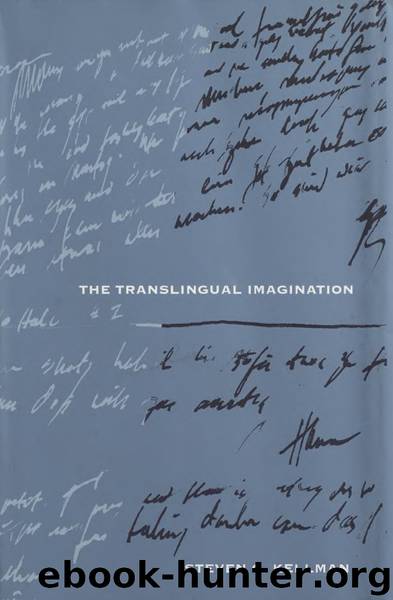The Translingual Imagination by Steven G. Kellman

Author:Steven G. Kellman [Kellman, Steven G.]
Language: eng
Format: epub
ISBN: 978-0-8032-7447-1
Publisher: University of Nebraska Press
Published: 2014-05-14T16:00:00+00:00
5
NABOKOV AND THE PSYCHOMORPHOLOGY
OF ZEMBLAN
War, famine, oppression, and technology have combined in the twentieth century to create unprecedented levels of global swarming. And as a result of human mobility, linguistic boundaries have become increasingly porous. Literary translingualism is not a monstrosity and, as we have seen, has even become relatively common. Hundreds of authors have adopted as their literary medium a language different from their native tongue. A smaller number—including Beckett, Brink, Brodsky, Das, Kundera, Ngugi, O’Brien, Pessoa, Rilke, and Wilde—have even produced significant work in more than one language.
However, exceedingly rare is an author who manages to become a major figure in two linguistic traditions. Mendele Mokher Sforim, who pioneered both modern Yiddish fiction and modern Hebrew fiction, is one. But even more remarkable is the achievement of Vladimir Nabokov in two of the three languages in which he wrote prose. He described his privileged upbringing in czarist Russia as that of “a perfectly normal trilingual child in a family with a large library” (Strong Opinions 43). By 1938, when he began writing his first book in English, The Real Life of Sebastian Knight, Nabokov was—under the nom de plume V. Sirin, the émigré author of Invitation to a Beheading (1935), Despair (1936), and The Gift (1938)—already among the most brilliant Russian novelists of the twentieth century. After Nabokov ceased being Sirin, his subsequent novels—including Lolita (1955), Pnin (1957), Pale Fire (1962), and Ada (1969)—earned him a separate position in the Anglophonic canon. Asked which of his three childhood languages he considered most beautiful, Nabokov replied: “My head says English, my heart, Russian, and my ear, French” (Strong Opinions 49). His output in French is sparse and slight, but Nabokov could write quite adroitly with either his head or his heart. And the evidence of “Mademoiselle O,” the solitary entry in The Stones of Vladimir Nabokov that is written in French, does not refute its author’s conviction that, had he not been forced to flee Paris in 1940, he could have grown a Gallic ear: “I might have been a great French writer” (quoted in Field 141).
“The ambidextrous universe” of Vladimir Nabokov, to use D. Barton Johnson’s words, not only testifies to extraordinary mastery of two very different languages. Through neologism, paranomasia, anagrams, acrostics, palindromes, alliteration, and other verbal play, it also foregrounds language itself—as a crucial element in literary composition and as a cognitive problem. In no Nabokov novel is language itself so much at issue as in Pale Fire, where tenebrous lexical systems construct a poem, contrive its exegesis, and leave a gaping gap between the two. “We think not in words but in shadows of words” (Strong Opinions 30), Nabokov told an interviewer in 1963, a year after publishing the book of his that is most intent on recording the penumbral traces of language. If the verbal transparency of Albert Camus’s lucid L’Etranger constitutes, according to Roland Barthes, le degré zéro de l’écriture, then the ostentatious artifice of Nabokov’s Pale Fire represents the nth degree of writing.
Download
This site does not store any files on its server. We only index and link to content provided by other sites. Please contact the content providers to delete copyright contents if any and email us, we'll remove relevant links or contents immediately.
4 3 2 1: A Novel by Paul Auster(12363)
The handmaid's tale by Margaret Atwood(7750)
Giovanni's Room by James Baldwin(7316)
Asking the Right Questions: A Guide to Critical Thinking by M. Neil Browne & Stuart M. Keeley(5751)
Big Magic: Creative Living Beyond Fear by Elizabeth Gilbert(5745)
Ego Is the Enemy by Ryan Holiday(5409)
The Body: A Guide for Occupants by Bill Bryson(5072)
On Writing A Memoir of the Craft by Stephen King(4925)
Ken Follett - World without end by Ken Follett(4718)
Adulting by Kelly Williams Brown(4562)
Bluets by Maggie Nelson(4542)
Eat That Frog! by Brian Tracy(4514)
Guilty Pleasures by Laurell K Hamilton(4437)
The Poetry of Pablo Neruda by Pablo Neruda(4089)
Alive: The Story of the Andes Survivors by Piers Paul Read(4017)
White Noise - A Novel by Don DeLillo(3999)
Fingerprints of the Gods by Graham Hancock(3983)
The Book of Joy by Dalai Lama(3968)
The Bookshop by Penelope Fitzgerald(3841)
